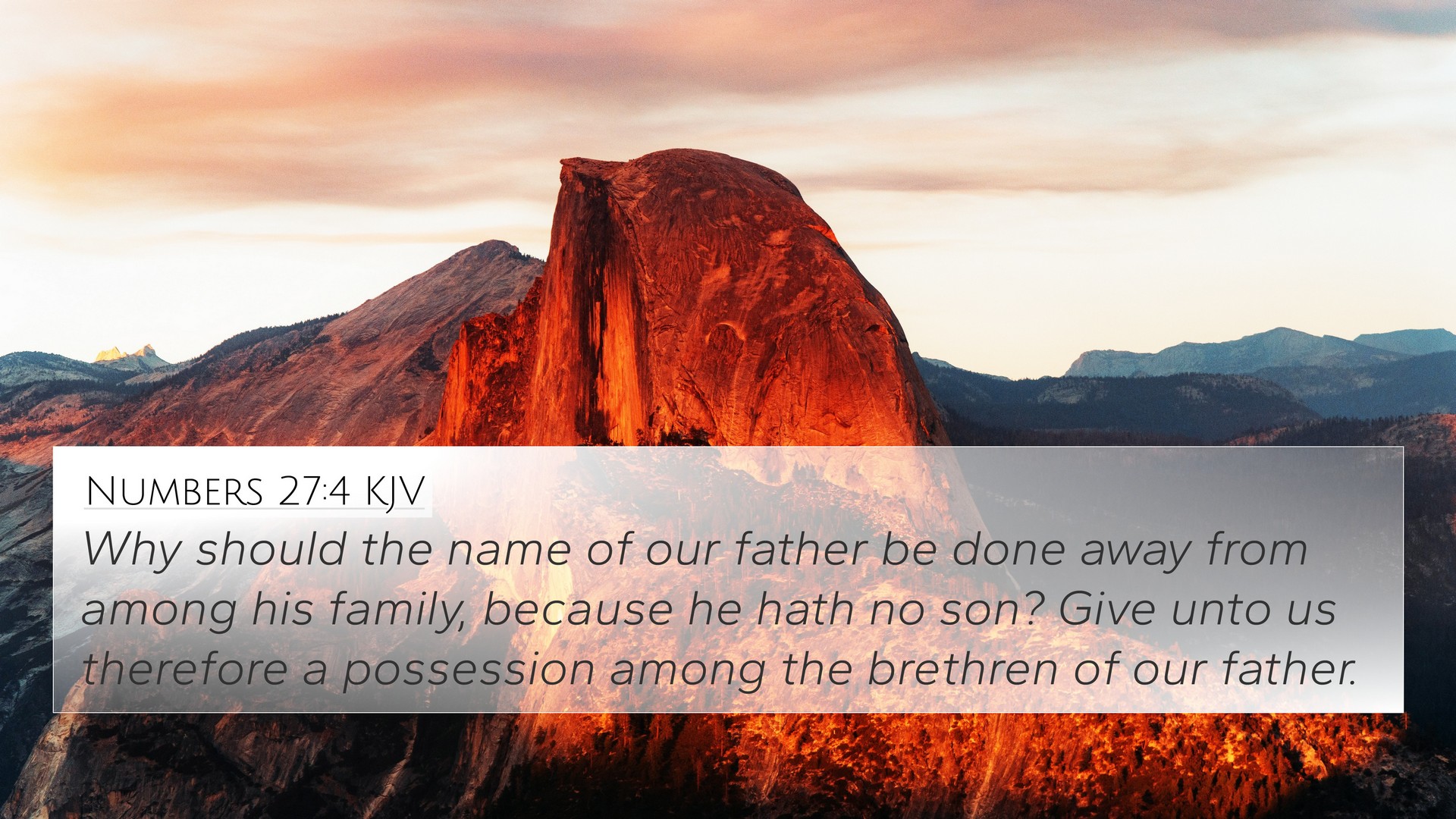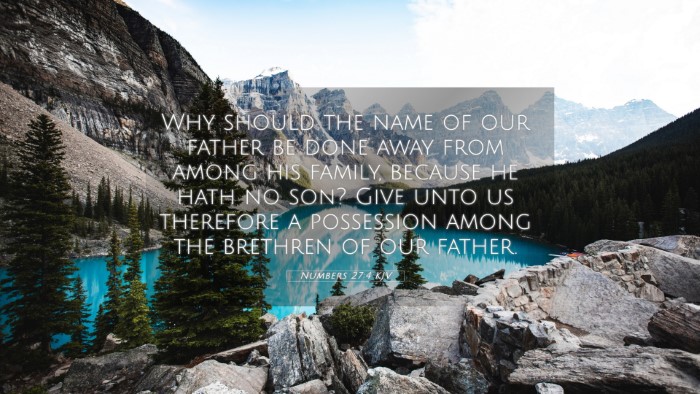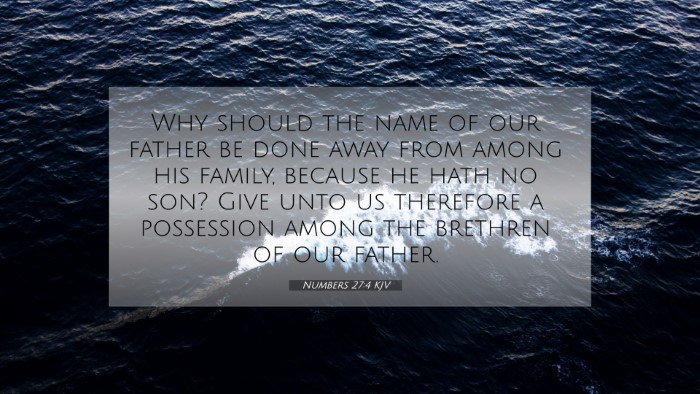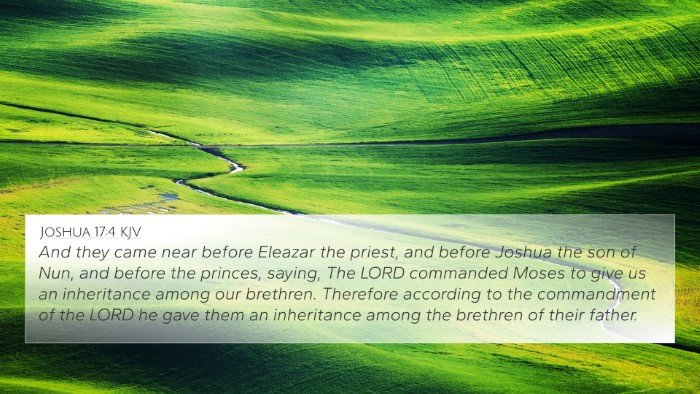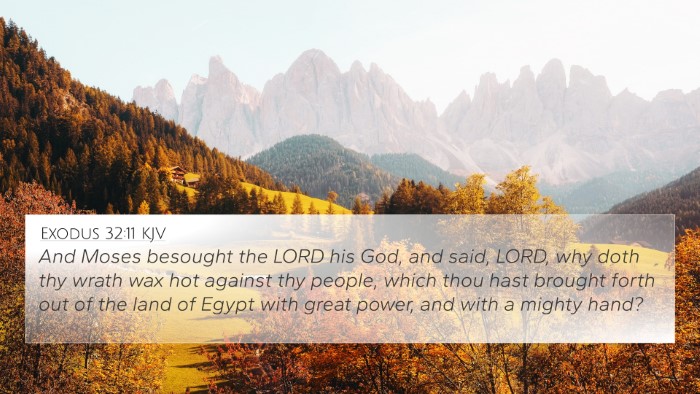Understanding Numbers 27:4
In Numbers 27:4, the daughters of Zelophehad approach Moses with a valid concern regarding their inheritance rights in the land of Canaan due to the death of their father, who had no male heirs. Their request for a share in the inheritance is a pivotal moment, showcasing their faith and assertiveness in seeking justice. The verse reads:
"Why should the name of our father be removed from among his family because he had no son? Give us a possession among the brothers of our father."
Commentary Insights
Matthew Henry's Commentary:
Matthew Henry emphasizes the courage of the daughters and their rightful claim to their father's inheritance. He highlights that they were not only seeking personal gain but were advocating for the name and legacy of their father. Their appeal illustrates the importance of family lineage and the need for equitable distribution of property, setting a precedent for future inheritances in Israel.
Albert Barnes' Notes:
Albert Barnes focuses on the legal and social implications of the daughters' request. He notes that their boldness reflects a proper understanding of God's justice and the significance of inheritance laws. Barnes argues that this incident shows God's willingness to address injustices and adapt laws to ensure fairness, demonstrating His concern for all individuals.
Adam Clarke's Commentary:
Adam Clarke provides a deeper exploration of the cultural context, explaining that in ancient Israel, lands were primarily divided among male offspring. Clarke sees the daughters' actions as a reflection of their faith in God’s promise that they would inherit the land of Canaan. He highlights their desire to secure their rightful position within the covenant community.
Cross-References and Related Verses
Numbers 27:4 forms a connection with several other scripture passages, which can deepen our understanding of its themes:
- Joshua 17:3-4: Zelophehad's daughters receive their inheritance, emphasizing the fulfillment of God's justice.
- 1 Peter 3:7: Encourages understanding and respect within family relationships, which resonates with the acknowledgment of women's rights.
- Galatians 3:28: Highlights equality in Christ, reinforcing the idea that all believers, regardless of gender, have equal access to God's promises.
- Deuteronomy 21:15-17: Discusses inheritance rights, particularly concerning birth order and the rights of sons versus daughters.
- Proverbs 31:16: Reflects on the significance of women in the economic fabric of society.
- Luke 20:34-36: Discusses the resurrection and the status of believers, illustrating a different perspective on earthly inheritance.
- Matthew 5:5: Blessed are the meek, connecting to the daughters’ humble but strong request.
Thematic Connections
The passage exemplifies several key biblical themes, including justice, inheritance rights, and the role of women in the covenant community. These themes are crucial for understanding the broader narrative of God's plan for His people:
- Justice and Equity: The Lord's responsiveness to the daughters' plea stresses the importance of justice.
- Faith and Courage: The act of petitioning for rights showcases their faith in God’s promises.
- Community and Family: The interdependence of family and communal rights is highlighted.
Tools for Cross-Referencing
For those interested in exploring further, tools for cross-referencing can enhance understanding and study:
- Bible Concordance: A valuable resource to find related verses and themes.
- Bible Cross-Reference Guide: Helps identify connections between scriptures.
- Cross-reference Bible Study: Methodologies to engage deeply with the text.
Conclusion
Numbers 27:4 serves as a powerful reminder of God's justice and the important role of women in His kingdom. The connections made through cross-referencing other scriptures illuminate not only the historical context but also the timeless truth that God acknowledges and honors all who call upon Him with sincerity and bold faith. By understanding these interconnections, one can appreciate the intricate tapestry of scripture that weaves together themes of justice, family, and divine promise.
